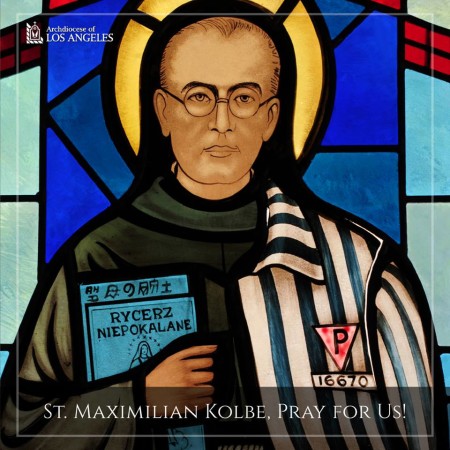 St. Maximilian Mary Kolbe (1894-1941)
St. Maximilian Mary Kolbe (1894-1941)
Image Courtesy: Archbishop Jose Gomez
(EWTN) Born in Pabiance (Soviet occupied) Poland and baptized ‘Raymond’ in the local Parish Church, he joined the ‘Order of Friars Minor Conventual’ at Lvov (then Poland) where he took the name ‘Maximilian’ and subsequent to completing his preliminary studies, he was sent to the ‘International Seraphic College’ in Rome to pursue doctorates in Philosophy and Theology.
In 1917 on the occasion of the 75th Anniversary of the conversion of Alphonse Ratisbonne a renowned anti-Catholic and agnostic who later became a Jesuit Catholic Priest, Maximilian was moved by divine grace to found a devout religious association of the faithful known as the Militia of the Immaculate which ‘encourages total consecration to the Blessed Virgin Mary as a means of spiritual renewal for individuals and society.’
Ordained a Priest in 1918 Fr. Maximilian Kolbe, returned to Poland to teach Church history in Krakow, where he would organize the first group of the Militia of the Immaculate outside of Italy. Due to ill health, Fr. Maximilian Kolbe was free to devote his time exclusively to the promotion of the ‘Militia’ and subsequently organizing the ‘Knight of the Immaculate’ a monthly Roman Catholic magazine, promoting the knowledge, love and service of the Immaculate Virgin, in the conversion of all souls to Christ Our Lord.
The phenomenal growth of this Apostolate led to the foundation the Monastery of the Immaculate Niepokalanow in December, 1927 to promote through mass media, Fr. Maximilian Kolbe’s mission to ‘win the world for the Immaculate’ and minister the ‘Good News’ to all according to Franciscan Media later founding one in Japan–Both the ‘Militia’ and the periodical ultimately reached the one-million mark in members and subscribers–Fr. Maximilian Kolbe’s love of God was daily filtered through his devotion to Mary.
After the invasion of Poland by the Nazi’s in 1939 the ‘Monastery of the Immaculate Niepokalanow’ which then housed more than 900 Friars was bombed and ransacked, Fr. Maximilian Kolbe together with about 40 Friars were taken to holding camps, first in Germany and later Poland, then released in less than 3 months on the Feast of the Immaculate Conception and permitted to return home.
During WW II the Friars turned to caring for about 5,000 Jewish refugees as well as providing a repair shop for farming machinery within the area.
In February 1941 the Gastepo returned to ‘Niepokalanow’ and rearrested Fr. Maximilian Kolbe–the Nazi’s purpose this time was to ‘liquidate’ undesirables. Fr. Maximilian was first taken to Pawiak Prison Camp in Poland Warsaw and subsequently transferred to Auschwitz.
Over the entrance of the concentration camp gate was a sign in German: “Arbeit Macht Frei” (‘Work Makes Free’) in reality upon entering the Prisoners were told that all Jews had the right to live only two weeks, Roman Catholic Priests, 1 month.
At Auschwitz, thousands of Catholic Priests were murdered according to Yad Vashem together with Nun’s such as Saint Teresa Benedicta (Edith Stein: Feast Day 09 August) and multitudes of undesirable Lay Catholics. The objective of Hitler in his hatred of Jesus Christ, was both to remove all witnesses to the truth of the original revelation of the God of Israel, as well as all who came to believe in Him in His Incarnation of the Blessed Virgin Mary.
Fr. Maximilian Kolbe’s response to the vicious hatred and brutality of the savage Nazi prison guards was ever obedient, meek and forgiving–he gave counsel to all his fellow prisoners:
“Trust in the Immaculate — Forgive! Love your enemies and pray for your persecutors.” Fr. Maximilian Kolbe was noted for his generosity, in surrendering his food, despite the ravages of starvation that he suffered and always going to the end of the line of the Infirmary, despite the acute tuberculosis that afflicted him.
In August 1941 a prisoner successfully escaped from the same section that Fr. Maximilian Kolbe was imprisoned. In reprisal, Auschwitz’s Commandant ordered death by starvation for 10 men chosen at random from the same section.
One of the condemned Sgt. Franciszek Gajowniczek shouted out lamenting that he would never see his wife and children again. In his place, Fr. Maximilian Kolbe who had been standing all night long during the selection of the condemned mercifully stepped forward, offering his own life in exchange for this man. — Ten days later, having led the other 9 in prayers and hymns, Fr. Maximilian Kolbe was given a lethal injection of carbolic acid and died.
Fr. Maximilian Kolbe was Beatified in 1973 by Pope Paul VI and Canonized in 1982 as a ‘Martyr of Charity’ by Pope Saint John Paul II
Related: Homily Pope John Paul II at Brzezinka Concentration Camp
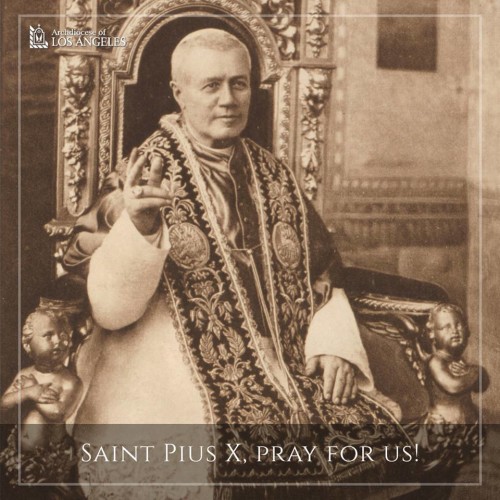 Pope Saint Pius X (1835-1914)
Pope Saint Pius X (1835-1914)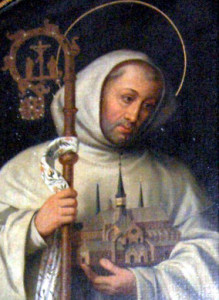
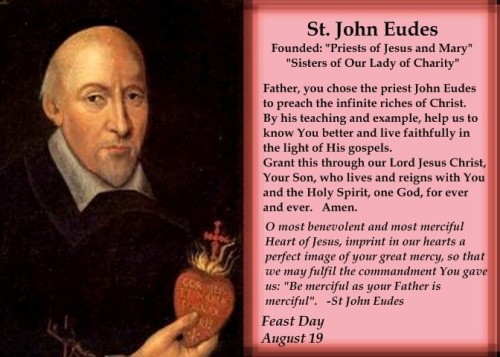 St John Eudes (1601-1680) Pray For Us –Image:
St John Eudes (1601-1680) Pray For Us –Image: 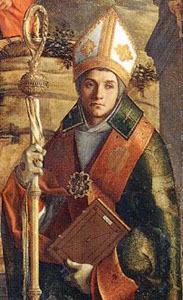
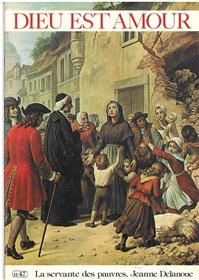
 St. Stephen of Hungary (975-1038)
St. Stephen of Hungary (975-1038)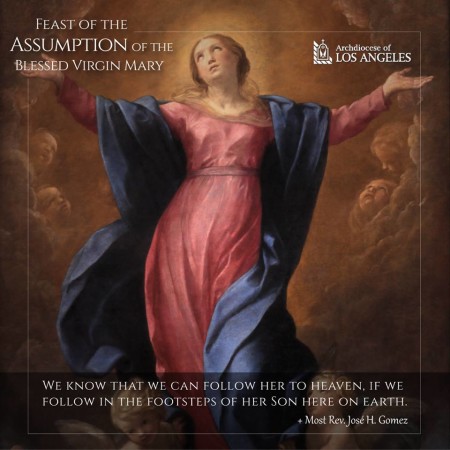 Assumption of the Feast of the Blessed Virgin Mary
Assumption of the Feast of the Blessed Virgin Mary St. Maximilian Mary Kolbe (1894-1941)
St. Maximilian Mary Kolbe (1894-1941)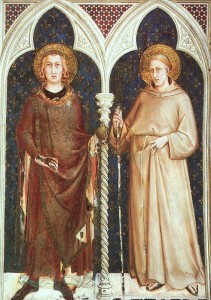 Pope Saint Pontian & Saint Hippolytus
Pope Saint Pontian & Saint Hippolytus St. Jane Frances de Chantal (1562-1641) –
St. Jane Frances de Chantal (1562-1641) –